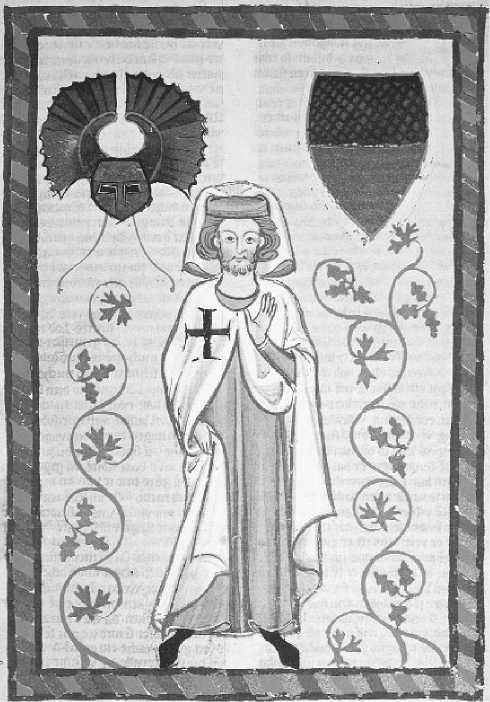A German lyric poet, not historically documented, but thought to have been active in the mid-thirteenth century, two of whose songs may belong in the context of crusade.
The Manesse Codex (MS Heidelberg, Universitatsbiblio-thek, cpg.848) from around 1350, which has the largest collection of his songs, pictures Tannhauser in the mantle of a knight of the Teutonic Order. His erotic and political lyrics show a strong tendency to parody the forms and themes of earlier courtly poetry.
The song “Wol ime, der nu beizen sol” (“Happy the man who goes hunting”) gives an ironic account of a Mediterranean voyage: unlike the knight who can hunt and disport himself in Apulia, he is tossed on the sea in a ship with tattered sails and broken rudder, buffeted by winds from all round the compass, subsisting on ship’s biscuit, salt meat, and stale wine. “May wave and ocean swell be purgatory for my sin!” [Kreuzzugsdichtung, ed. Muller, 71, strophe IV,

The poet Tannhauser in the robes of a Teutonic Knight. Manesse manuscript (MS Heidelberg, Universitatsbibliothek, germ.848), c. 1305-1340. (Archivo Iconograpfico, S. A./Corbis)
Lines 5-7]. Only sporadic phrases evoke the vocabulary of pilgrimage or crusade: “I left the land for God’s sake” (V, 15); “I’d have been shipwrecked on Crete but that God saved me” (III, 3-4). A penitent’s song attributed to Tannhauser in MS Jena, Universitatsbibliothek, E1.f.101, dating from around 1330, describes the decision, on a “joyful day” (I, 1), to renounce the world and seek salvation through penance, though it has no specific features of crusading lyric.
-Jeffrey Ashcroft
Bibliography
Kischkel, Heinz, Tannhausers heimliche Trauer: Uher die Bedingungen von Rationalitat und Suhjektivitat im Mittelalter (Tubingen: Niemeyer, 1998).
Kreuzzugsdichtung, ed. Ulrich Muller (Tubingen: Niemeyer, 1979).
Tannhauser: Die lyrischen Gedichte, ed. Helmut Lomnitzer and Ulrich Muller (Goppingen: Kummerle, 1973).
Thomas, John Wesley, Tannhauser: Poet and Legend (Chapel Hill: University of North Carolina Press, 1974).




 World History
World History









